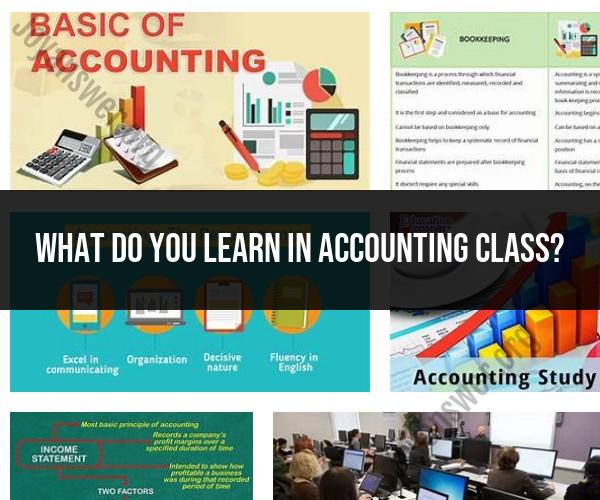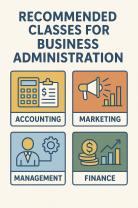What do you learn in accounting class?
In an accounting class, students learn the fundamental principles and practices of accounting, which is the process of recording, summarizing, analyzing, and reporting financial transactions and information. Accounting is a critical discipline for businesses, organizations, and individuals, as it provides the means to track and communicate financial data accurately. Here are some of the key topics and concepts typically covered in an introductory accounting course:
Financial Statements: Students learn how to prepare and interpret the three primary financial statements:
- Income Statement: Also known as the profit and loss statement, it shows a company's revenues, expenses, and net income (or loss) over a specific period.
- Balance Sheet: This statement provides a snapshot of a company's financial position at a specific point in time, showing assets, liabilities, and shareholders' equity.
- Cash Flow Statement: It details the cash inflows and outflows during a given period, helping assess a company's cash management.
Double-Entry Accounting: Students learn the foundational concept of double-entry accounting, which states that every financial transaction has equal and opposite effects on at least two accounts. This system ensures the accounting equation (Assets = Liabilities + Equity) remains in balance.
Recording Transactions: Students practice recording various types of transactions, such as sales, purchases, expenses, investments, and loans, using journals and ledgers.
Accrual vs. Cash Basis: Accounting classes typically cover the difference between accrual accounting (recording transactions when they occur, regardless of when cash changes hands) and cash basis accounting (recording transactions when cash is received or paid).
Financial Ratios: Students learn how to calculate and interpret financial ratios to assess a company's performance and financial health. Common ratios include liquidity ratios, profitability ratios, and leverage ratios.
Inventory Valuation: Accounting courses often cover different methods of valuing inventory, such as First-In, First-Out (FIFO), Last-In, First-Out (LIFO), and Weighted Average.
Accounting for Depreciation: Students learn how to account for the depreciation of assets over time, using methods like straight-line depreciation and declining balance depreciation.
Budgeting: Basics of budgeting, including creating and managing budgets for individuals and organizations, are often introduced.
Internal Controls: Accounting classes emphasize the importance of internal controls to safeguard assets and ensure the accuracy of financial reporting.
Ethics in Accounting: Students discuss the ethical considerations and professional standards that guide the accounting profession, including issues related to transparency, honesty, and integrity.
Taxation: Introductory accounting courses may introduce students to basic tax principles, including income tax for individuals and businesses.
Financial Analysis: Techniques for analyzing financial statements and making informed decisions based on financial data are explored.
Accounting Software: Familiarity with accounting software packages, such as QuickBooks or Excel, may be part of the curriculum, especially in practical accounting courses.
Accounting classes can vary in complexity and depth, depending on the level of the course (introductory, intermediate, advanced) and the institution. More advanced courses may delve into topics like managerial accounting, auditing, and specialized areas such as forensic accounting or international accounting standards. Overall, accounting education equips students with valuable financial literacy and analytical skills applicable to various career paths, including accounting, finance, business management, and entrepreneurship.
Accounting Class Insights: What You Can Expect to Learn
Accounting is the process of recording, summarizing, and reporting financial transactions to provide information that is useful for decision-making. It is an essential skill for businesses of all sizes, and it can also be a valuable skill for individuals.
Accounting classes can teach you a variety of skills, including:
- How to record financial transactions: This includes learning how to debit and credit accounts, and how to use journal entries and ledgers.
- How to prepare financial statements: Financial statements provide a summary of a company's financial performance and position. The three most common financial statements are the balance sheet, the income statement, and the statement of cash flows.
- How to analyze financial data: Financial analysis involves using financial statements to assess a company's financial performance and make informed decisions.
- How to use accounting software: Accounting software can help automate many accounting tasks, such as recording transactions and preparing financial statements.
Unveiling the Curriculum of an Accounting Course
The specific curriculum of an accounting course will vary depending on the school and the level of the course. However, most accounting courses will cover the following topics:
- Introduction to accounting: This topic will cover the basics of accounting, such as the accounting cycle, the different types of accounts, and the rules of debit and credit.
- Financial accounting: This topic will cover the preparation of financial statements, such as the balance sheet, the income statement, and the statement of cash flows.
- Managerial accounting: This topic will cover the use of accounting information to make management decisions.
- Auditing: This topic will cover the process of auditing financial statements.
- Tax accounting: This topic will cover the basics of tax accounting, such as income tax and sales tax.
The Essentials of Accounting Education: What Students Study
In addition to the topics listed above, accounting students may also study the following topics:
- Cost accounting: This topic covers the methods of accounting for the costs of producing goods and services.
- Forensic accounting: This topic covers the use of accounting skills to investigate crimes.
- Governmental accounting: This topic covers the accounting principles and procedures used by government agencies.
- Nonprofit accounting: This topic covers the accounting principles and procedures used by nonprofit organizations.
Accounting is a challenging but rewarding field. By taking accounting classes, you can learn the skills you need to succeed in a variety of careers.
Here are some additional tips for accounting students:
- Find a good accounting textbook: A good accounting textbook will explain the concepts in a clear and concise way.
- Get involved in accounting clubs and organizations: This is a great way to meet other accounting students and learn from professionals in the field.
- Intern at an accounting firm: This is a great way to gain real-world experience in accounting.
- Get certified: There are a number of accounting certifications available, such as the Certified Public Accountant (CPA) certification. Getting certified can make you more marketable to potential employers.
Accounting is an important skill for businesses and individuals alike. By taking accounting classes, you can learn the skills you need to succeed in a variety of careers.












